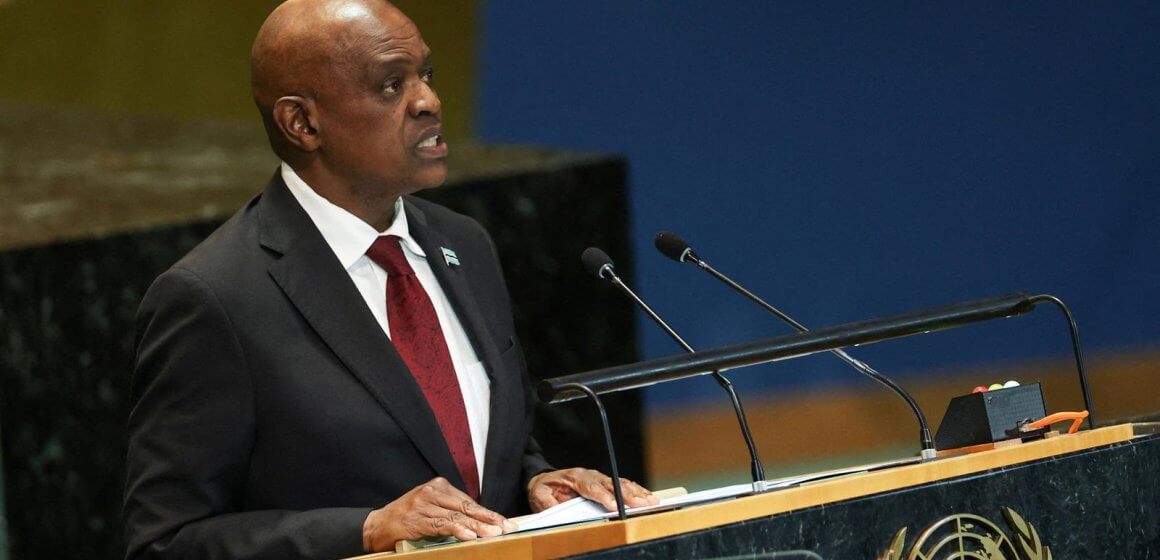|
LISTEN TO THIS THE AFRICANA VOICE ARTICLE NOW
Getting your Trinity Audio player ready...
|
In a stunning shift, Botswana’s decades-old political landscape was upended as voters ousted the ruling Botswana Democratic Party (BDP) after 57 years in power. Once the country’s most prominent party, the BDP was pushed aside in a historic election that saw the rise of the Umbrella for Democratic Change (UDC), signaling a new era for the diamond-rich southern African nation.
By Friday afternoon, official tallies showed the BDP winning only four parliamentary seats, paving the way for the UDC, which secured a decisive 35-seat majority. President Mokgweetsi Masisi, acknowledging the defeat, reached out to UDC leader Duma Boko to offer his congratulations and support for a peaceful transition.
The election results marked a dramatic twist in Botswana’s history, as the BDP had governed since the country gained independence in 1966. The party’s popularity had dwindled in recent years, with slow economic growth and soaring unemployment casting shadows over its legacy. During a press briefing, Masisi reflected on the party’s missteps, candidly admitting, “We got it wrong big time.” The president, elected in 2018, had campaigned on promises of “change,” but disillusionment grew as Botswana’s economic and employment challenges persisted.
In his farewell address, Masisi emphasized his respect for Botswana’s democratic principles and urged his supporters to accept the outcome. “I will step aside gracefully and ensure a smooth transition,” he declared. He assured Boko of his continued support, saying, “You can count on me to provide whatever guidance you might need.”
For Boko, a seasoned lawyer and human rights advocate, the victory held both personal and national significance. Speaking to the media, the 54-year-old expressed humility and resolve. “This is a historic day for Botswana. It demonstrates our democracy’s maturity and the power of peaceful change,” he said, promising to prioritize economic reforms that would address inequality and job creation.
Celebrations erupted across Botswana, particularly in the capital, Gaborone, where young people flooded the streets to welcome the new administration. For 23-year-old Mpho Mogorosi, the election’s outcome was deeply meaningful. “I never thought I’d witness this change. The BDP was in power for too long, and it’s time for a better Botswana,” she told Reuters.
Under Boko’s leadership, the UDC has pledged an ambitious economic overhaul, promising to create up to 500,000 jobs within the next five years. Botswana’s high unemployment rate has remained a critical issue, particularly among the youth, despite the country’s vast diamond reserves and thriving tourism industry. Newly elected UDC Member of Parliament Kgoberego Nkawana highlighted these challenges in an interview with the BBC, pointing to the widespread reliance on government handouts. “People are struggling without jobs; it’s tough. We need real solutions,” Nkawana emphasized.
The election also marked a symbolic rebuke of the BDP’s former ally, the Botswana Patriotic Front (BPF), led by former President Ian Khama, who split from the BDP. The BPF managed to secure five seats, while the Botswana Congress Party (BCP) won 14.
Political analyst Lesole Machacha lauded Botswana’s peaceful transition, noting it as a rare example of democratic stability in Africa. “To see a shift in power like this, with such calm acceptance, is commendable,” Machacha said.











LEAVE A COMMENT
You must be logged in to post a comment.